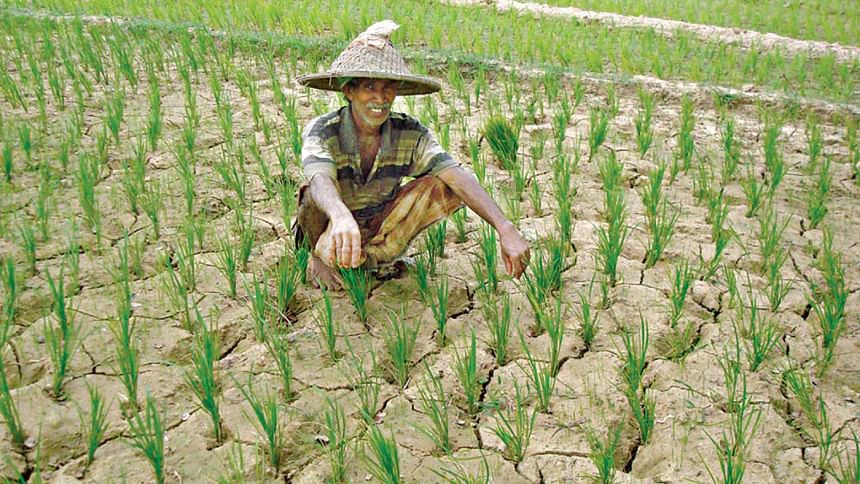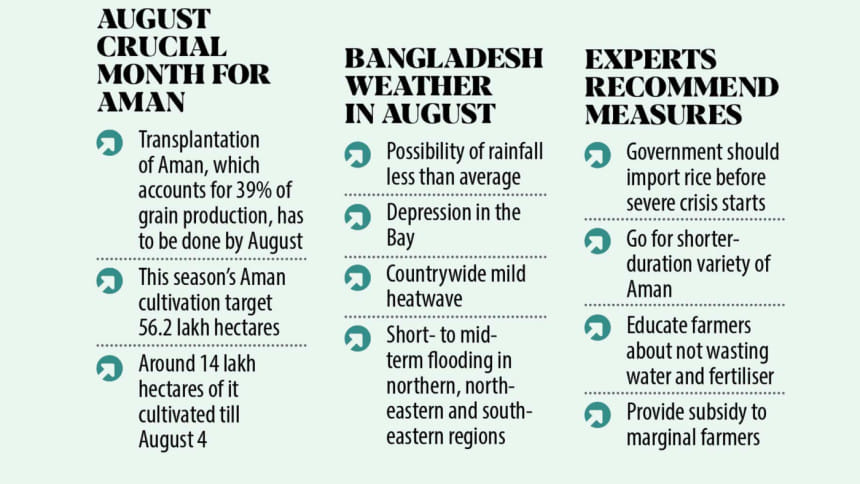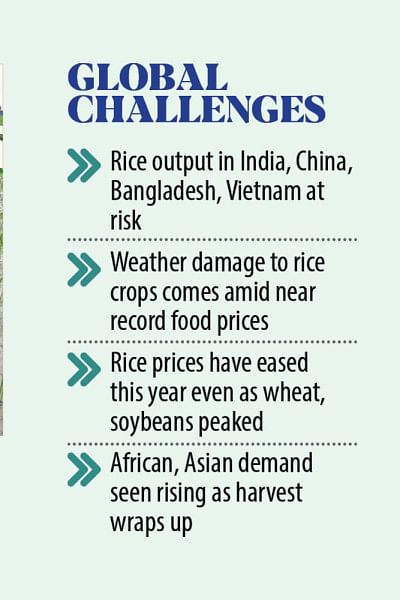Waiting for the rain

"The government should focus on supplementary irrigation at free of cost to encourage farmers and ensure production. As floods have damaged seedlings in some places, the government should come up with agricultural rehabilitation programmes immediately."
After a spell of extreme heat and scanty rain in the last two consecutive months, farmers across the country were expecting favourable weather for a good harvest of rain-fed Aman paddy, which accounts for 39 percent of total grain production.
But much to their dismay, the weather forecast says the rainfall this month will be less than the monthly average of 460mm, which may trigger a drop in Aman yield and rise in the production cost.
Apart from the low rain, according to the Bangladesh Meteorological Department, mild heat waves may hit the country while some parts may witness short- and mid-term flooding.
Experts fear the lack of rains coupled with higher temperature will delay the transplantation of Aman, the second biggest crop in Bangladesh after Boro, a worrying prospect amid the rising prices of cereals.
The adverse weather will make the farmers go for supplementary irrigations to get the expected yield, which will push up the production cost, they said.
Like Bangladesh, rice output is also at risk in other top rice suppliers, including India, where adverse weather is threatening to reduce the production and stoke food inflation that is already near record highs, according to an analysis by Reuters.

The report citing data from India's state-run weather department said top rice producing states of Bihar, Jharkhand, West Bengal and Uttar Pradesh have recorded a monsoon rainfall deficit of as much as 45 percent so far this season.
Rice has bucked the trend of rising food prices amid bumper crops and large inventories at exporters over the past two years, even as Covid-19, supply disruptions and more recently the Russia-Ukraine conflict made other grains costlier, says the analysis.
But the inclement weather in exporting countries in Asia, which accounts for about 90 percent of the world's rice output, is also likely to change the price trajectory, it said, quoting traders and analysts.
"Rice has remained accessible even as overall food prices reached record levels earlier this year," Reuters quoted UN's Food and Agriculture Organisation economist, Shirley Mustafa, as saying.
"We are now witnessing weather-related setbacks in some key rice producing countries, including India, China and Bangladesh, which could result in lower output if conditions don't improve in the next few weeks," Mustafa added.
In Bangladesh, the government had set a target to bag 1.63 crore tonnes of Aman to offset the losses of Boro and Aus crops caused by floods.
As of August 4, farmers could transplant Aman on around 14 lakh hectares of land against the government's target of 56.2 lakh hectares, according to the Department of Agricultural Extension (DAE).


Aman production is heavily reliant on monsoon rains as the process of preparing seedbeds for transplanting seedlings is almost over during the peak June-August rainy season, say agriculturists.
A large number of farmers in the northern, northeast and south-eastern districts have been facing difficulties in preparing their land to transplant Aman seedlings for a lack of rain during the main transplantation season.
Although affluent farmers are irrigating their fields by pumps, those in some areas are still observing the situation before transplanting seedlings.
Sadek Hossain, a farmer of Kawadighi of Moulvibazar Sadar upazila, said cracks have developed on his crop field and he could not prepare the land due to the lack of rain.
"In normal times, I would have prepared my land for transplanting Aman by now. But the situation is different this year as I am still waiting for rain," he told The Daily Star.
He said they usually do not use deep tubewells for irrigation because it rains in this season every year. "So, farmers from our region did not have any preparation for irrigation. I do not know what will happen," said a frustrated Sadek.
Abdul Halim from Gobindaganj of Gaibandha said he did not face such a problem last year as there were rains. But this year it is already late and he could not finish Aman transplantation.
"This year I have to irrigate my land with a deep tubewell to transplant Aman. I am transplanting slowly, still expecting rains," said Halim, who is cultivating Aman on two acres. "The cost of irrigation will be a burden on me."
Abdus Salam, a farmer of Hamchiapur village in Pabna, could not even start Aman cultivation on his two bighas due to the lack of water. The production is uncertain.
Md Abdul Mannan, a meteorologist, said as rainfall is likely to be low and temperature will rise this month, the Aman management will be significantly hampered.
"Farmers will need irrigation which will increase the cost of production. On the other hand, delayed transplantation will reduce the life cycle of the plant. This will hamper production," he added.
Habibur Rahaman Chowdhury, director of the field services wing of the DAE, said although the rate of transplantation was low due to poor rainfall in July, it would be completed by this month.
"We are now witnessing weather-related setbacks in some key rice producing countries, including India, China and Bangladesh, which could result in lower output if conditions don't improve in the next few weeks."
"In many areas, farmers are waiting for rains for Aman transplantation and in some areas, farmers are in fear of possible flooding. However, if everything remains in favour, the crucial part of Aman cultivation -- that is transplantation -- will be completed by this month," he said.
There have been a spell of low rainfall and high temperature in the country over the last two months. June's average rainfall is 439.9mm but this year it's 423.8mm -- down by 3.6 percent.
The situation turned worse in July as the rainfall was 57.6 percent less than the last 30 years' average for that month and lowest in the last 41 years in Bangladesh.
WHAT IS TO BE DONE?
Experts suggested the government come up with a package of subsidies to ensure production of the rice in this critical time when the overall economy is under pressure.
AMM Shawkat Ali, a former food adviser to the caretaker government, said there are double troubles for Aman farmers -- poor rainwater for the rain-fed crops and seedlings crisis.
"The government should focus on supplementary irrigation free of cost to encourage farmers and ensure production. As floods have damaged seedlings in some places, the government should come up with agricultural rehabilitation programmes immediately."

Otherwise, he said, there will be a shortfall in Aman production which is already predicted in a USDA report published recently. "Because of this, our dependence on the international market for rice import will increase which is risky in this crisis period."
As Aman production will be hampered, policymakers should immediately sit together to find out the strategy to fill up the production gap, he suggested.
M Asaduzzaman, a former research director of BIDS, said another pressure on farmers is that the government has increased the price of Urea fertiliser.
"Farmers in our country waste irrigation water and fertiliser. The government has to work very proactively to reach out to farmers and make them understand about not wasting water and fertiliser. It will save their money," he said.
Besides, he said, many farmers could not prepare their Aman seedbeds. "So, if possible, the government should provide them with the Aman variety with a shorter lifespan."
The lack of rainfall not only creates a problem for farmers to cultivate Aman, also for the Boro, Asaduzzaman told The Daily Star yesterday. "The low rain means our groundwater will not be recharged and farmers will face problems irrigating during the Boro season."
As the adverse weather across top rice producing countries is threatening to reduce the output of rice, he said, the government should make a good stock of rice by imports before the international price goes up.



 For all latest news, follow The Daily Star's Google News channel.
For all latest news, follow The Daily Star's Google News channel. 



Comments